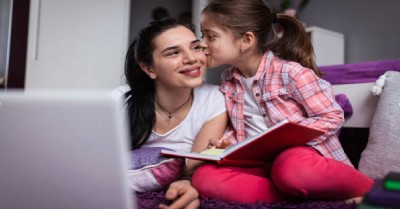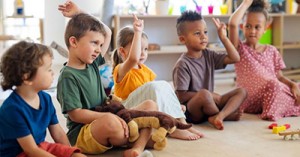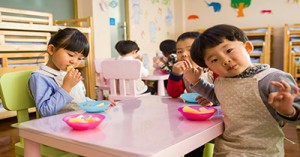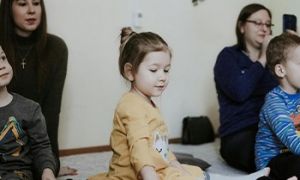Gratitude makes the children more positive, and optimistic and also gives more strong social connections. Gratitude helps the child to relish good memories and gives strength to fight with all the odds and adversity in life. The following article provides information on the Benefits of Learning Gratitude, Strategies To Teach Children Gratitude and more.
Benefits Of Learning Gratitude
The Associate Director of the Centre for Compassion and Altruism Research and Education at Stanford University, Emma Seppala summarised the benefits that a child gets from learning of gratitude which can be said in the following ways:
- Gratitude help to be happy with little things in life.
- Gratitude brings satisfaction in life.
- Gratitude makes the children away from negativity and stress.
- Gratitude makes the social connection so strong that children would never feel alone in life.
- Gratitude helps to stay the happiness long in life.
Learning gratitude is not only helpful for children but also for any other aged people as it helps to strengthen willpower, improve sleep and also help to increase social intelligence. Gratitude is such a thing, if you show it to others, it will pay you back by giving more establishment emotionally and socially. A person with gratitude never feels alone as gratitude connected people with others strongly.
Teaching Gratitude To Children
We need to instil gratitude in children not only to make them more acceptable to others but also to make them emotional and socially independent. Here are a few strategies that will support teaching gratitude to children.
Model gratitude
Children learn things very quickly by watching and observing. Adults have to be the role models in front of them while in the case of showing gratitude. If anybody helps you or gives you something, maybe a very little thing, still show gratitude to that person. Talk to your child about these incidents and explain to him that you have shown gratitude to that person. Even when the child helps you with something like opening the door or bringing you the umbrella, show him gratitude.
Teach them to say “thank you”
You should always need to teach a child to say Thank You if anybody performs any favour to them. Practice the same with the child also. Practice these things outdoors also. Tell them that “thank you” is a magical word that makes people happy and also shows gratitude to them.
Talk to them about gratitude
Ask them the question what is the thing for which you are grateful? Help them to be empathetic. Ask them what he feels for less fortunate children around the world. Ask them to show their feelings of happiness to the person who is responsible for it.
Perform an act of kindness
Children will eventually adapt to your acts. To perform an act of kindness and explain to them why and how you have done this. Perform acts of kindness of them also. Teach them to be more empathetic by practising empathy.
Create a ritual
You may create rituals for children to celebrate gratitude. At the dinner table, all of you may list down what has been good throughout the day. Then they will notice that might be the day is tough still there is some good things. Then tell them to show their happiness for those goods that had happened to them throughout the day to the person who was responsible for those.
Practice gratitude even if you are in a dark time
Never forget to show gratitude when you are in tension or anxiety. Always in even tough times also show gratitude to others and to children also. That will make them understand that gratitude is part of life and it needs to show in any good or bad time.
A goodbye “thank you”
A goodbye “thank you” should be learned by the children for passing the whole day. Maybe there is disappointment or sadness in your day but as you end the day you need to say thank you before leaving. This habit will also children to understand that showing gratitude is a part of life and also will help them to learn to be happy with little things in life.
Martin Seligman, psychologist, and educator. “It’s not happy people who are thankful. It’s thankful people who are happy.” Gratitude gives resilience to children and we all want our children to be happy in the future. So that is why learning gratitude is essential for every child.
Further Reading
Encouraging Kindness in Young Children - The following article provides information on the Importance Of Kindness, Teaching Kindness and more.
Random Acts Of Kindness For Children - The following provides a list of acts of kindness that children can complete.
The Kindness Curriculum - The following article provides information on The Kindness Curriculum has a range of activities that support young children to explore 12 attributes of kindness building agency, initiate their own learning and develop their self-identity.
Growing A Gratitude Tree - Free Template - It is given to families so they can participate in the program with their child by decorating a leaf and writing what their child is grateful for to hang on a Gratitude Tree displayed in the room.
Reference:
Teaching Gratitude For Children's Health, University Of Melbourne







 Open ended questions cannot be responded to with one word answers such as yes or no. These types of questions enables a child to provide
Open ended questions cannot be responded to with one word answers such as yes or no. These types of questions enables a child to provide During your child’s preschool years, an important milestone begins to emerge. This is the development of pre-writing skills. Pre-writing skills are used to encourage, develop
During your child’s preschool years, an important milestone begins to emerge. This is the development of pre-writing skills. Pre-writing skills are used to encourage, develop Open ended materials enables children to play freely. They are objects that have no rules to follow, use or function. Raw materials that can be
Open ended materials enables children to play freely. They are objects that have no rules to follow, use or function. Raw materials that can be An Acknowledgment of the Country is a way of showing respect for the Traditional Owners and can be given by both non-Indigenous people and Aboriginal
An Acknowledgment of the Country is a way of showing respect for the Traditional Owners and can be given by both non-Indigenous people and Aboriginal Language plays an important role in a child’s development. It enables a child to communicate effectively with their family, learn at school, socialize with friends,
Language plays an important role in a child’s development. It enables a child to communicate effectively with their family, learn at school, socialize with friends, Like adults, children have to deal with their own stress in life. Moving house, starting a new school, preparing for a new sibling - these are
Like adults, children have to deal with their own stress in life. Moving house, starting a new school, preparing for a new sibling - these are Playdough is such a versatile material. It provides numerous benefits to children as they manipulate it, it is safe and soothing and provides children with
Playdough is such a versatile material. It provides numerous benefits to children as they manipulate it, it is safe and soothing and provides children with Teaching children about sustainability enables them to appreciate and respect the natural environment. Early childhood services can provide meaningful hand on learning experiences in order
Teaching children about sustainability enables them to appreciate and respect the natural environment. Early childhood services can provide meaningful hand on learning experiences in order Recycling is an important concept that teaches children to care for the environment. It encourages children to be responsible and show a growing appreciating for
Recycling is an important concept that teaches children to care for the environment. It encourages children to be responsible and show a growing appreciating for When children apply paint to paper, glue things together, or pound a lump of clay, they experiment with colour, shape design and texture.
When children apply paint to paper, glue things together, or pound a lump of clay, they experiment with colour, shape design and texture.



